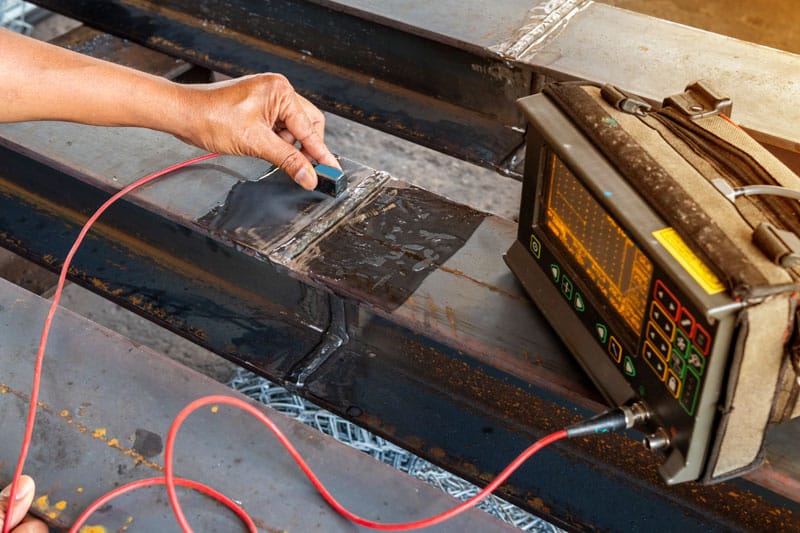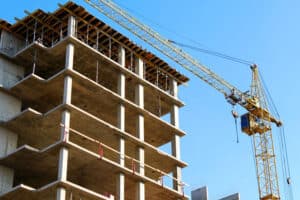What Is Ultrasonic Testing?
Ultrasonic Testing is a technique that employs sound waves at frequencies higher than human hearing (typically between 500 kHz and 20 MHz) to inspect the internal structure of materials. By sending these sound waves into a material and analysing the reflected signals, we can identify flaws like cracks, voids, and inclusions that aren’t visible on the surface.
Why Choose UT for Inspection?
Detecting internal defects early is crucial to prevent failures and ensure the longevity of your equipment. UT offers:
- Deep Penetration: Able to inspect thick materials and detect flaws deep within.
- High Sensitivity: Capable of detecting small defects.
- Versatility: Works on a variety of materials, including metals, plastics, and composites.
- Immediate Results: Provides real-time feedback during the inspection.
Industries That Benefit from UT
Ultrasonic Testing is widely used across many sectors to ensure the integrity of components and structures. Here’s how different industries utilise UT:
Oil & Gas
UT is essential for inspecting pipelines, pressure vessels, and storage tanks, detecting internal corrosion and cracks that could lead to leaks or explosions.
Mining
Heavy machinery components and structural supports are inspected using UT to find internal flaws that could cause unexpected failures.
Power Generation
In power plants, UT checks turbines, boilers, and heat exchangers for internal defects, preventing costly outages and enhancing safety.
Marine
UT assesses the thickness of ship hulls and offshore structures, identifying corrosion and internal defects that could compromise seaworthiness.
Engineering & Fabrication
Manufacturers use UT for quality control, ensuring welded joints and fabricated parts are free from internal flaws.
Transportation
From aircraft to trains, UT inspects critical components like axles, wheels, and structural elements to maintain safety standards.
Construction
UT evaluates the integrity of concrete structures, steel beams, and other construction materials, ensuring they can withstand required loads.
Military & Defence
Defence equipment requires utmost reliability. UT helps maintain vehicles, aircraft, and weapon systems by detecting internal flaws.
How Does the UT Process Work?
Here’s a step-by-step overview of how we perform Ultrasonic Testing:
1. Preparation
- Select the Appropriate Probe: Choose the right transducer based on material type, thickness, and expected defects.
- Clean the Surface: Ensure the area is free from dirt, rust, and scale for optimal contact.
2. Couplant Application
- Apply Couplant: A gel or liquid is used to facilitate the transmission of sound waves from the probe into the material.
3. Inspection
- Transmit Sound Waves: The probe sends ultrasonic pulses into the material.
- Receive Reflected Waves: Flaws reflect the sound waves back to the probe.
- Analyse Signals: The equipment interprets the reflected signals, displaying them on a screen as waveforms or images.
4. Interpretation
- Identify Defects: By analysing the signals, technicians can determine the presence, location, and size of internal flaws.
- Measure Thickness: UT can also accurately measure material thickness, detecting thinning due to corrosion.
5. Documentation
- Record Findings: Detailed reports are created, including the nature and location of any defects and recommendations for action.
Advantages of UT
- Non-Destructive: No damage to the material being tested.
- Deep Penetration: Capable of inspecting thick sections.
- Accurate: Provides precise information about defect size and location.
- Versatile: Suitable for various materials and shapes.
- Safe: No harmful radiation involved.
Considerations When Using UT
- Surface Access: Requires access to one side of the material.
- Skill Level: Interpretation of results requires experienced technicians.
- Material Limitations: Not as effective on coarse-grained materials like cast iron.
- Geometry Constraints: Complex shapes may be challenging to inspect.
FAQs
Q: Can Ultrasonic Testing detect all types of internal flaws?
A: UT is highly effective for detecting cracks, voids, and inclusions, but its effectiveness can vary based on material type and flaw orientation.
Q: Is UT suitable for non-metallic materials?
A: Yes, UT can inspect plastics, composites, and ceramics, although the inspection parameters may differ from those used for metals.
Q: Do I need to shut down my equipment for UT?
A: In many cases, UT can be performed while equipment is in service, but this depends on safety considerations and accessibility.
Q: How accurate is thickness measurement with UT?
A: UT provides very accurate thickness measurements, often within a fraction of a millimeter, making it ideal for corrosion monitoring.
Q: Is UT safe for operators and the environment?
A: Yes, UT uses sound waves and does not involve radiation, making it safe for both operators and the environment.
Ready to Uncover Hidden Internal Flaws?
Ultrasonic Testing is a powerful tool for ensuring the integrity of your materials and components. Our certified technicians are equipped with advanced UT equipment to provide accurate and reliable inspections tailored to your needs.









